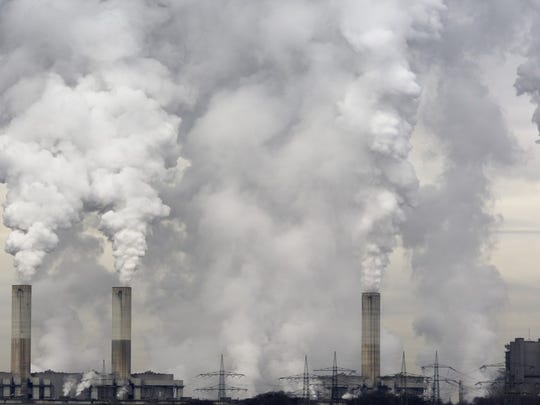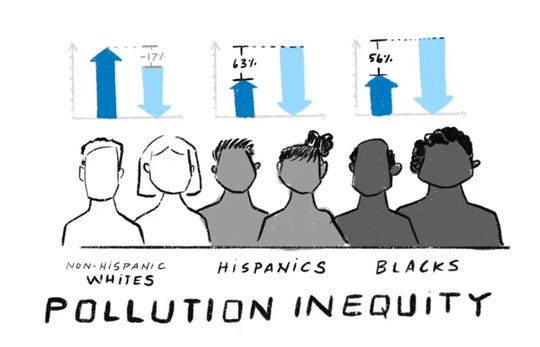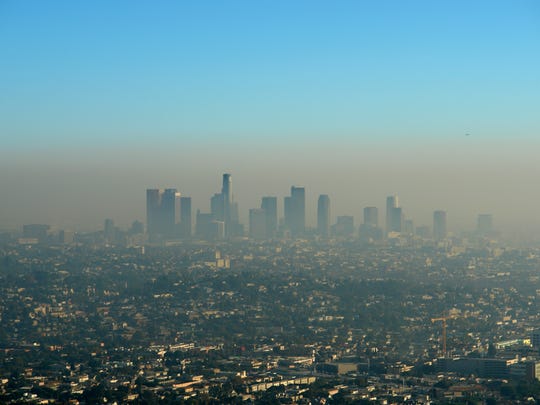While the air pollution in the U.S. has gotten cleaner in the past decade, pollution inequity has remained high. USA TODAY
The air that Americans breathe isn't equal.
Blacks and Hispanics disproportionately breathe air that's been polluted by non-Hispanic whites, according to a study. This new research quantifies for the first time the racial gap between who causes air pollution – and who breathes it.
(Last time I heard about 'non-Hispanic whites' one of them killed Trayvon Martin)
(Last time I heard about 'non-Hispanic whites' one of them killed Trayvon Martin)
"Pollution is disproportionately caused by whites, but disproportionately inhaled by black and Hispanic minorities," the study said.
Poor air quality remains the largest environmental health risk in the United States, the study warns. In fact, with 100,000 deaths per year, more Americans die from air pollution than car crashes and murders combined.
“Even though minorities are contributing less to the overall problem of air pollution, they are affected by it more,” said study co-author Jason Hill, an engineering professor at the University of Minnesota, who is white. “Is it fair (that) I create more pollution and somebody else is disproportionately affected by it?”
Hill said that while the air in the U.S. has gotten cleaner in the past decade, pollution inequity has remained stubbornly high.
"What is especially surprising is just how large pollution inequity is and has been for well over a decade," Hill said.

According to a new study, blacks and Hispanics disproportionately breathe air that's been polluted by whites. This new research quantifies for the first time the racial gap between who causes air pollution – and who breathes it. (Photo: acilo / Getty Images)
The type of pollution analyzed in the study is known as "PM 2.5" – tiny grains of "particulate matter" that are especially dangerous to human health because they can get deep into our lungs. Those particles, at 2.5 micrometers far smaller than the width of a human hair, are produced by car tailpipes, power plant smokestacks, and burning materials.
The study found that black and Hispanic Americans bear a "pollution burden:" Blacks are exposed to about 56 percent more pollution than is caused by their consumption. For Hispanics, it is slightly higher – 63 percent.
However, non-Hispanic whites experience a "pollution advantage," meaning they breathe about 17 percent less air pollution than whites cause.
The formula scientists used in their study is driven by disparities in the amount of goods and services that groups consume and in the exposure to the resulting pollution.
“On average, whites tend to consume more than minorities. It’s because of wealth,” Hill said.
For example, the scientists found that whites spend more money on pollution-intensive goods and services than do blacks and Hispanics, which means they generate more pollution than the other groups do.

Non-Hispanic whites experience about 17 percent less air pollution than they cause, while Hispanics are exposed to about 63 percent more air pollution than they cause. And blacks are exposed to about 56 percent more air pollution than they cause. Dark blue arrows indicate pollution produced while the light blue arrows show pollution exposure. (Photo: University of Minnesota / Proceedings of the National Academy of Sciences)
“Someone had to make the pen you bought at the store,” said study co-author Julian Marshall, an engineering professor at the University of Washington. “We wanted to look at where the pollution associated with making that pen is located. Is it close to where people live? And who lives there?”
For this study, the category "non-Hispanic whites" also includes Asian-Americans and Native Americans. This is based on the source that the researchers used: government data on personal expenditures from the U.S. Bureau of Labor Statistics.
Other experts agreed with the research: “These findings confirm what most grassroots environmental justice leaders have known for decades, ‘whites are dumping their pollution on poor people and people of color,’” said Texas Southern University public affairs professor Robert Bullard, who was not part of the research. Bullard often called the father of environmental justice, is African-American.
Researchers say their pollution inequity formula could be used on other types of environmental burdens.
"The approach we establish in this study could be extended to other pollutants, locations, and groupings of people," Marshall said. "When it comes to determining who causes air pollution – and who breathes that pollution – this research is just the beginning."
The study was published Monday in the peer-reviewed journal Proceedings of the National Academy of Sciences.

A layer of brown smog hovers above Los Angeles. A new study found that blacks are exposed to about 56 percent more air pollution than is caused by their consumption. For Hispanics, it is slightly higher – 63 percent. (Photo: Getty Images)

No comments :
Post a Comment